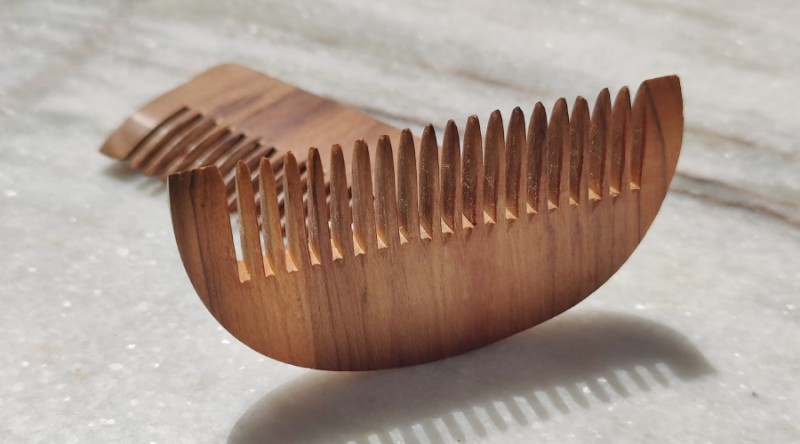
In the pursuit of luscious locks, the choice of hair tools plays a pivotal role. While the market is flooded with various options, one often overlooked gem is the wooden comb. Dive into the realm of wooden combs and discover the plethora of benefits they offer for your hair health.
Wooden combs, crafted from materials like sandalwood, neem, or bamboo, have been a beauty secret for centuries. Let's delve into the reasons why these natural combs have stood the test of time.
Wooden combs boast smooth and rounded teeth, gently gliding through knots without causing breakage. Bid farewell to the painful tugging associated with plastic combs.
Unlike their plastic counterparts, wooden combs don't generate static electricity. This translates to a reduction in frizz, leaving your hair smoother and more manageable.
Certain wooden combs, especially those made from neem wood, possess natural antibacterial properties. Regular use can help maintain a healthy scalp by preventing microbial growth.
Let's explore the specific advantages that using a wooden comb can bring to your hair care routine.
The gentle massaging action of a wooden comb stimulates blood circulation in the scalp, promoting hair growth. It's like a spa day for your hair follicles!
Wooden combs absorb the natural oils from your scalp and distribute them evenly along the hair shafts. This natural conditioning leads to softer and shinier locks.
Traditional combs often cause hair breakage due to their rough edges. Wooden combs, with their smooth finish, help in reducing breakage and split ends.
Sandalwood and other aromatic woods used in crafting these combs impart a subtle fragrance to your hair, adding a touch of nature to your daily routine.
Wooden combs are eco-friendly alternatives to plastic ones. Choosing them aligns with sustainable living practices, contributing to a greener planet.
Not all wooden combs are created equal. Consider these factors when selecting the perfect wooden comb for your hair.
Different woods offer various benefits. Neem wood is excellent for its antibacterial properties, while sandalwood adds a fragrant element to your hair care.
Select a comb with the right tooth density based on your hair type. Fine teeth work well for thin hair, while wider-spaced teeth are suitable for thick, curly locks.
Opt for combs with finely crafted, smooth teeth. Poorly finished combs can snag and damage your hair.
Now that you're acquainted with the benefits and how to choose the right one, let's discuss how to seamlessly integrate wooden combs into your daily hair care routine.
Wooden combs are most effective on dry hair. Begin by gently detangling from the tips and gradually work your way up.
Take a few extra minutes to massage your scalp with the wooden comb. This not only feels relaxing but also stimulates blood flow.
Keep your wooden comb in top-notch condition by regularly cleaning it. Use a mild solution of water and a gentle shampoo to remove any buildup.
Let's address some common misconceptions about wooden combs to ensure you make an informed choice.
Contrary to popular belief, wooden combs aren't limited to a specific subculture. They are versatile tools suitable for everyone seeking healthier hair.
Well-crafted wooden combs are durable and can last for years with proper care. They might even outlast their plastic counterparts.
As we wrap up our exploration, it's evident that wooden combs offer a holistic approach to hair care. From promoting hair growth to reducing breakage, these natural wonders deserve a place in your beauty arsenal. Remember, your hair deserves the best, and sometimes, the best comes in the form of a simple wooden comb.
How Swami Vivekananda's Connection to Yoga Creates Harmony of Mind, Body, and Soul